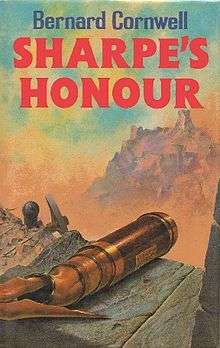Sharpe's Honour (novel)
 First edition | |
| Author | Bernard Cornwell |
|---|---|
| Country | United Kingdom |
| Language | English |
| Series | Richard Sharpe stories |
| Genre | Historical novels |
| Publisher | Collins |
Publication date | January 1985 |
| Media type | Print (Hardcover and Paperback) and audio-CD |
| Pages |
320 pp (hardcover edition)) 375 pp (paperback edition) |
| ISBN |
0-00-221426-1 (hardcover edition) ISBN 0-00-617198-2 (paperback edition) |
| OCLC | 12585347 |
| Preceded by | Sharpe's Enemy |
| Followed by | Sharpe's Regiment |
Sharpe's Honour is the sixteenth historical novel in the Richard Sharpe series by Bernard Cornwell, first published in 1985. In the Vitoria Campaign of the Peninsula War in 1813, Sharpe is framed for murder. He must find a way to clear his name to preserve the fragile alliance between Britain and Spain during the Napoleonic Wars.
Plot summary
Major Pierre Ducos plans to make a peace between France and Spain, depriving the British of their allies in the Peninsular and forcing them to withdraw. He forms an alliance with the Spanish priest Father Hacha and his brother, the partisan El Matarife. He then arranges for La Marquesa Helene to write letters to her husband claiming Sharpe tried to rape her. La Marques challenges Sharpe to a duel and Sharpe accepts but the fight is interrupted by Sharpe's commanding officer Colonel Leroy. That night, La Marques is murdered and Sharpe is accused. He is found guilty by court martial and sentenced to death. However, his friend Michael Hogan arranges for another man to be hanged in his place, sending Sharpe to search for Helene in order to clear his name.
Meanwhile, in return for their help in murdering La Marques and gaining the support of the French nobles, Ducos arranges for Helene to be forced into a nunnery, meaning her husband's wealth will go to Hacha and Matarife. Sharpe tracks her down and frees her, fleeing from Matarife's men. However, he is captured by General Verigny, a French officer and one of Helene's lovers, but refuses to give his parole promising not to escape. He is briefly tortured by Ducos before Verigny intervenes. Helene proposes Sharpe give his parole, then she and Verigny will allow him to escape. Sharpe refuses the dishourable plan but manages to escape anyway when a powder magazine is ignited.
At the Battle of Vitoria, Sharpe's regiment the South Essex are left leaderless when Leroy is killed. Sharpe manages to find his men and assume command, leading them to victory. He and Harper then manage to track down Matarife, who has captured Helene in the chaos of the French retreat. Sharpe fights Matarife and forces him to confess to La Marques' murder before killing him. Sharpe and Harper then beat Hacha until he agrees to comply with a cover story clearing Sharpe's name.
Television adaptation
The novel was adapted as the last episode of the second season of the Sharpe television series, guest starring Alice Krige as La Marquesa, Nickolas Grace as Father Hacha and Matthew Scurfield as El Matarife. It retained the same basic plot as the novel but had a number of differences: It is written as Sharpe's first meeting with La Marquesa (since her earlier appearance, Sharpe's Sword, was not adapted until later), Harper accompanies Sharpe's on his mission to find her (effectively taking the place of a partisan boy named Angel from the book), Hogan and Leroy are omitted and replaced with Nairn, Hacha is killed by Ducos for his failure whereas in the book he survives and El Matarife's death is altered, being shot by Major Mendoza as he prepares to stab Sharpe in the back rather than having his throat slit by Sharpe. It also added an extra scene at the beginning where Ducos outlines his plans to Napoleon (played by Ron Cook).
Publication history
Sharpe's Honour was the sixth book in the Sharpe series written by Cornwell by order of year of publication. After the addition of many more novels to the successful series it resides about two thirds of the way through the series and Sharpe's military career.